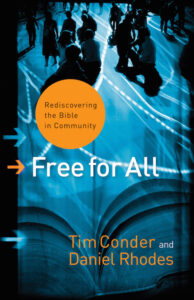 Rediscovering the Bible in Community
Rediscovering the Bible in Community
In this 2009 publication, PLT Fellow Traveler Tim Conder and Contributor Daniel Rhodes write to revitalize the study of scripture. They argue that reading the Bible is only as authentic as our cultural and social spheres dictate. Through the lived experiences of Emmaus Way pastorships, Conder and Rhodes write to uncover this unavoidable influence and illustrate the liberation that communal Bible study offers to the individual and the church.
PLT Contributor Stanley Hauerwas reviews:
“It’s not easy to make the familiar odd, but Conder and Rhodes accomplish that feat by helping us recover what it means to read Scripture in communion. This is not another book that recommends a communal interpretation of Scripture, but it is a book that exhibits such readings by close analysis of texts. This book will be widely read in congregations and classrooms.”
To read more on this publication, click here. Find more information on Rhodes’s current writing project on Cesar Chavez with SILT 16/17: Can I Get a Witness? here. To be directed to the SILT 16/17 initiative page, click here.
Tim Conder is the founding pastor of Emmaus Way Church (Durham, NC). He is presently a PhD Candidate in Cultural Studies at University of North Carolina; his research interests include social movements, identity theories, and theological ethnography. His publications also include The Church in Transition: The Journey of Existing Churches into the Emerging Culture (2006).
Daniel Rhodes is the faculty coordinator of contextual education at the Institute of Pastoral Studies at Loyola University Chicago. His work centers on “The History of the Future: Apocalyptic, Community Organizing, and the Theo-politics of Time in an Age of Global Capital.” Rhodes is interested in political theology, broad-based community organizing, capitalism and Christianity, globalization, sovereignty and governance, and war and peace studies.
Fellow travelers are scholars, activists, and practitioners that embody the ideals and commitments of the Project on Lived Theology. We admire their work and are grateful to be walking alongside them in the development and dissemination of Lived Theology.
